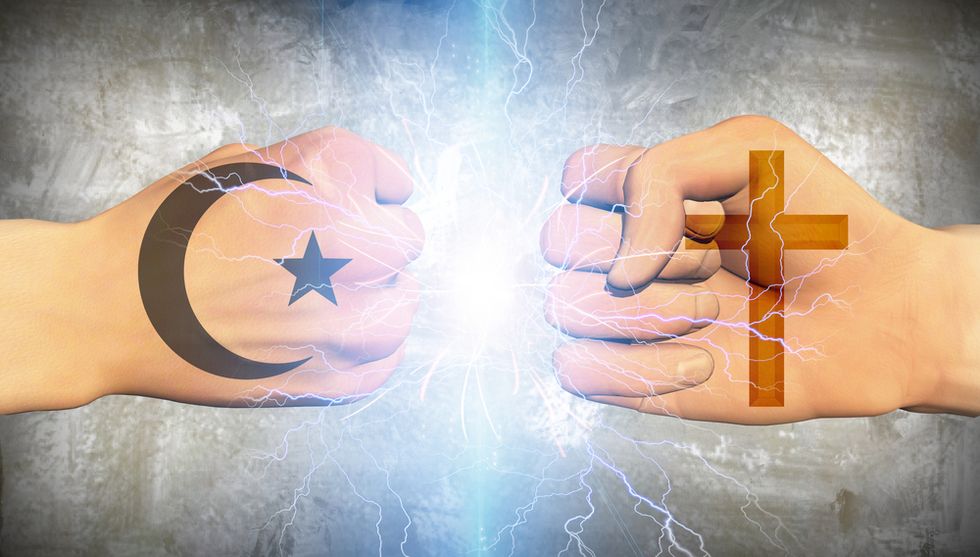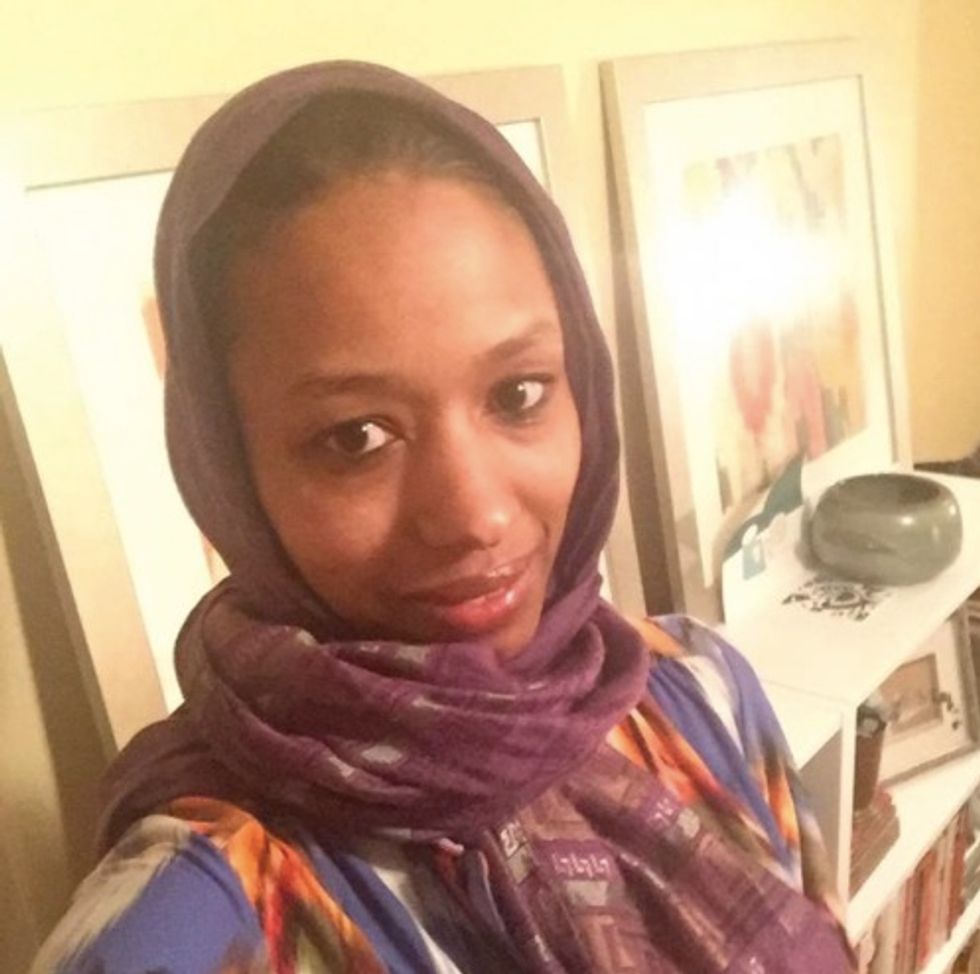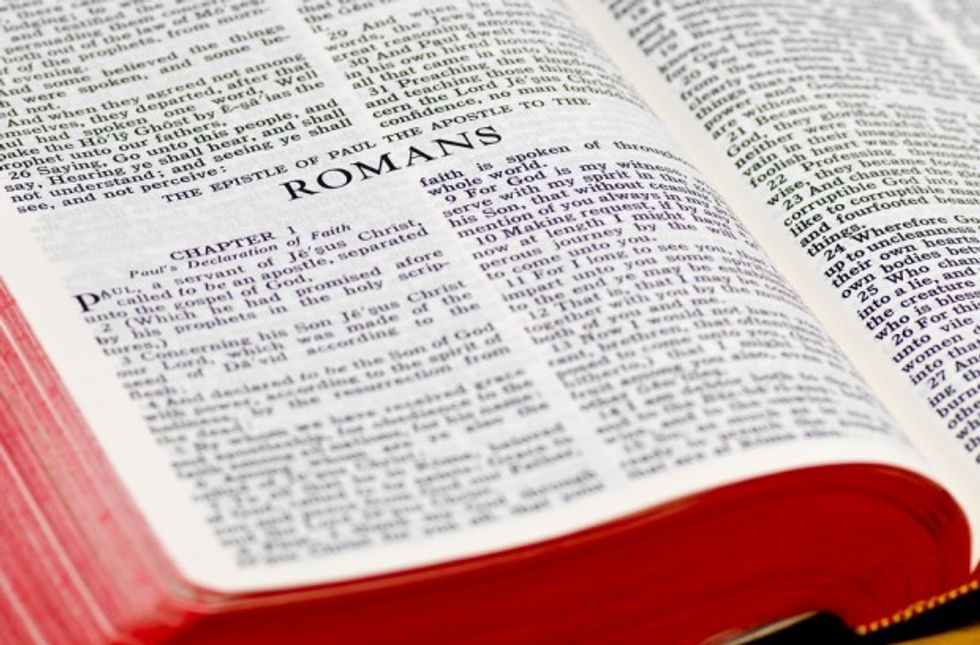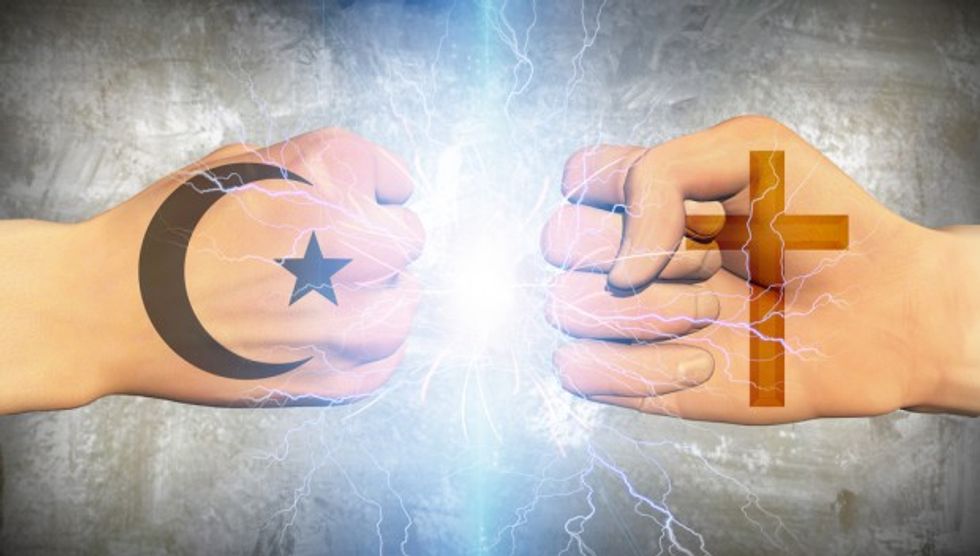
Photo credit: Shutterstock

The suspension of a Christian college professor who said that Muslims and Christians "worship the same God" has garnered a great deal of attention in recent weeks, with a reignited debate raging over a key theological question: Do Muslims and Christians revere the same Lord?
Let's start exploring this paradigm by noting how Dr. Larycia Hawkins, the political science professor who could end up losing her job over her theological proclamation, framed her comments about Islam and Christianity in a social media post published last month.
“I stand in religious solidarity with Muslims because they, like me, a Christian, are people of the book,” she wrote in a Dec. 10 Facebook comment, announcing that she would wear a hijab — an Islamic headscarf — throughout the advent season in an effort to stand in solidarity with Muslims. “And as Pope Francis stated last week, we worship the same God.”

It was the theological ideals embedded in these comments that led Wheaton College in Wheaton, Illinois, to suspend the professor, pending further review; she now risks dismissal after talks reportedly broke down between the two parties.
During an interview with Chicago Tonight following her suspension, Hawkins affirmed her belief that Christians and Muslims worship the same God, but said that they do so "differently."
"In no way did I make a moral equivalency between Jesus and Muhammad or Islam and Christianity,” she said. “That would be offensive to my Muslim friends and it would be offensive to my Christian friends to pretend that the religions are the same, that they’re not different, either in practice or theology.”
So, all that aside, the broader question is whether the Muslim and Christian God is truly the "same," as Hawkins proclaimed.
In addition to theological debate, it seems that there's a fair amount of contention over what the word "same" actually encompasses, as individuals on both side of the debate seek to break down the finer elements in an effort to reach a definitive conclusion.

With Hawkins' suspension garnering a plethora of media attention, Wheaton College has setup a frequently asked questions page to address a variety of issues, including the very question of whether Christians and Muslims worship the same God. In its response, the institution affirmed its belief that "salvation is through Christ alone."
"While Islam and Christianity are both monotheistic, we believe there are fundamental differences between the two faiths, including what they teach about God’s revelation to humanity, the nature of God, the path to salvation, and the life of prayer," the statement reads. "As an institution of distinctively evangelical Christian identity, the core of our faith, as expressed in our Statement of Faith, is our belief that 'the Lord Jesus Christ died for our sins, according to the Scriptures, as a representative and substitutionary sacrifice, triumphing over all evil; and that all who believe in Him are justified by His shed blood and forgiven of all their sins.'"
Again, this isn't the first time that this question and debate have emerged, with Timothy George questioning in a 2002 article for Christianity Today whether the "God of Muhammad" and "the Father of Jesus" are the same, saying that the answer is both a "yes" and a "no."
"Yes, in the sense that the Father of Jesus is the only God there is. … Christians and Muslims can together affirm many important truths about this great God — his oneness, eternity, power, majesty," George wrote. "But the answer is also No, for Muslim theology rejects the divinity of Christ and the personhood of the Holy Spirit — both essential components of the Christian understanding of God. … Apart from the Incarnation and the Trinity, it is possible to know that God is, but not who God is."
 Photo credit: ShutterStock.com
Photo credit: ShutterStock.com
Protestant theologian Miroslav Volf got more specific in a 2011 blog piece on the Huffington Post titled, "Do Christians and Muslims Worship the Same God?" writing:
The fact of the matter is this: fearful people bent on domination have created the contest for supremacy between Yahweh, the God of the Bible, and Allah, the God of the Quran. The two are one God, albeit differently understood. Arab Christians have for centuries worshiped God under the name "Allah." Most Christians through the centuries, saints and teachers of undisputed orthodoxy, have believed that Muslims worship the same God as they do. They did so even in times of Muslim cultural ascendency and military conquests, when they represented a grave threat to Christianity in the whole of Europe.
Stepping into the contemporary battle surrounding Hawkins, Volf penned a Washington Post op-ed in the wake of the Wheaton scandal, giving it a title that plainly offered up his view on the dispute: "Wheaton Professor’s Suspension Is About Anti-Muslim Bigotry, Not Theology."
In it, the theologian said that Hawkins's statement was that "Muslims and Christians worship the same God," not that they believe the same things or are the same religion. Volf noted that the professor also didn't deny that "God was incarnate in Christ," nor did she ignore the role of the holy trinity — the staple of orthodox Christianity.
"There isn’t any theological justification for Hawkins’s forced administrative leave. Her suspension is not about theology and orthodoxy," he wrote. "It is about enmity toward Muslims. More precisely, her suspension reflects enmity toward Muslims, taking on a theological guise of concern for Christian orthodoxy."
Volf also insisted that there is some inconsistency among Christians who argue that Muslims' rejection of Jesus as savior means that they do not worship the same God, saying that these Christians do not hold the God of Israel in the Old Testament to the same standard.
Canadian scholar John G. Stackhouse also recently explored these issues on his blog, saying that he's "scratching his head" over Wheaton's initial decision to suspend Hawkins, explaining his perspective in detail.
"I rather wish Professor Hawkins simply hadn’t gotten into what we academic types might call 'the comparative doctrine of God' by linking her act of solidarity with Muslims (which I commend on the basis of love for neighbour) with a particularly troublesome phrase, 'Muslims and Christians worship the same God,'" he wrote. "You don’t need the latter to justify the former."

But New Testament scholar Scot McKnight said that he sees two issues when it comes to the question of whether Christians and Muslims worship the same God — one pertains to theology and one that involves the definition of the word "same."
Here's what he wrote about the matter on his Patheos blog:
I have said this before and will say it again: we can agree to some degree at a generic level, but we don’t worship God in the generic. We worship either the God of Abraham and Moses, the God of our Lord Jesus Christ, or the God of Mohammed. The God in each of the faiths is understood differently enough to conclude that saying we worship the “same” God muddies the water.E.g.,. we could say these things that show they three are sufficiently dissimilar:
1. There is only one God and he has taken on human form in one person, Jesus Christ.
2. The one God has revealed himself most completely in Jesus Christ, who was crucified and raised, so that cruciformity is central to Who God is.
3. The one God is revealed in Three Persons, Father, Son and Spirit.
Neither Judaism nor Islam embraces any of these, so there is good reason to say they are not the same.
GotQuestions.org, a Christian website that explores biblical themes, has also tackled the "same God" issue on its website, explaining that the main point of contention is the trinity and, thus, the embrace or rejection of the incarnation of Christ.
The site's description of the issue also alluded to the fact that people might be asking the wrong question or using improper terminology when invoking the "same God" argument.
"So, do Christians and Muslims worship the same God? A better question is, 'Do Christians and Muslims both have a correct understanding of who God is?'" the site reads. "To this question, the answer is definitely no. Because of crucial differences between the Christian and Muslim concepts of God, the two faiths cannot both be true. The biblical God alone addresses and solves the problem of sin by giving His Son."
The site does note that there are some similar views of God among Christians and Muslims, including the idea of one God made the universe, though major differences abound from there in terms of central theology.
Albert Mohler, president of The Southern Baptist Theological Seminary in Louisville, Kentucky, also penned a 2013 piece for the Billy Graham Evangelistic Association in which he discussed the terms that Muslims and Christians use to describe God, connecting these names to the central themes that he believes underpin each faith.

In the end, he concluded that the two religions are essentially built on different gods, especially when considering how each refers to its respective "God."
"We can now see that the name of God is no small matter. The deity we name is the God we believe in. Christians believe in only one God, and He is the Father who sent the Son to save us from our sins," Mohler wrote. "Allah has no son, and, thus, Christians cannot know God as Allah. In this light, Muslims and Christians do not only use different names for God; in reality, these different names refer to different gods."
The debate rages on. What do you think? Do Christians and Muslims worship the same God? Let us know what you think in the comments section below.
(H/T: Christianity Today)
--
Front page image via Shutterstock.com.
--
Follow the author of this story on Twitter and Facebook:
Billy Hallowell